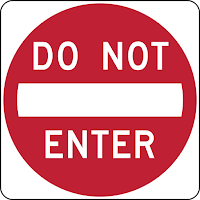Just after I entered the exam room, the patient offered this
declaration.
“I am not having a colonoscopy!”
I had not yet even introduced myself to her and her son, but
she was determined to set the ground rules. Of course, it should be the patient who
determines her own future, but generally this occurs after some dialogue with a
medical professional. After all, this is
why patients come to see us. However, this
octogenarian had managed to reach the age of 85 years intact, so clearly her
personal ‘owner’s manual’ has guided her well.
You have to respect success.
I suggested to her wryly that she might at least have waited
for me to recommend a colonoscopy before refusing one, but she clearly wanted
to assert her autonomy and authority. I reassured her that if she persisted in
refusing any recommended testing that I would support her decision. This
response relaxed her as intended. While
she may have been prepared to scrap with me, I communicated my own ground rules
that I would not be her adversary.
My professional task is to educate, inform and to prioritize
the options for my patients. I am not
the decision maker. I do my best to
equip patients with sufficient information so that they can make truly informed
choices, even if I may personally disagree with the decision from a medical
standpoint.
A very clear message from my patient.
After reviewing this patient’s medical history and data, it
was clear that a colonoscopy was medically necessary as I had concern that a
malignancy – which could be curable – might be the culprit. As part of the informed consent discussion, I also
candidly with her the risks of declining diagnostic tests
With unwavering confidence, this woman expressed that she intended
to be left alone. No scope would be
permitted to approach her. We shook
hands and I wished her well.
Over the years, I have come to appreciate more deeply how
many elderly folks use different medical playbooks than younger people do. Many times I have seen an elderly patient decline
testing while her child who is present tries to change her mind. In this example, two different playbooks are
being used.
I did counsel the woman and her son that she needs to be a
peace with her decision, regardless of unknown future medical
developments. Of course, she already
knew this. It’s in her playbook.


In similar circumstances I offer the patient an Air contrast BE. There is a good chance of picking up any lesion that would be a Cancer that is life threatening to an 85 year old person. A benign polyp would be another issue - some of it ethical. What is the likelihood that the polyp would progress to cancer before she died of 'natural causes'? A perforated colon could lead to major negative consequences for 'nothing'?
ReplyDeleteJust a thought.
An old gastroenerologist
Good point! I can't recall the last time I ordered a barium enema. Interpreting them was an art, and I daresay a lost one as the imaging community has evolved far beyond barium. Appreciate your comment.
ReplyDelete